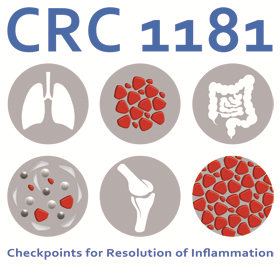Riesling for the immune system
How moderate alcohol consumption positively influences the immune system and inhibits autoimmune disease
Excessive alcohol consumption has adverse effects on health. However, moderate amounts of alcohol can have positive effects on health under certain circumstances. In a recent paper* published in Nature Communication, a research team from the Friedrich-Alexander University Erlangen-Nürnberg (FAU) shows how alcohol can specifically modulates the immune system protecting from the development of autoimmune diseases.
The intoxicating effects of alcohol have been widely reported. A team led by Prof. Dr. Mario Zaiss from the FAU’s Department of Internal Medicine 3 has investigated a less-known property of alcohol – its effect on the immune system. In medical literature there are several reports that alcohol can have a beneficial effect on a disturbed immune system: Interestingly surgeons reported already in 1995, that patients with liver transplantation practicing moderate alcohol consumption had a significantly lower risk of transplant rejection than patients not drinking alcohol. In addition, several epidemiological studies have shown that regular alcohol consumption reduces the risk of developing autoimmune disease, i.e. rheumatoid arthritis and multiple sclerosis. In such kind of diseases the body recognizes its own tissue as foreign and starts to fight against it. An important factor in triggering autoimmune diseases, are T-follicular helper cells, which are highly specified immune cells located in the lymph nodes and the inflammatory tissue.
How alcohol effects on the immune system
In their work, the team has now shown for the first time how alcohol inhibits autoimmune diseases such as rheumatism and multiple sclerosis. Alcohol is degraded in the body to an active metabolite, acetate, which is a potent inhibitor of the function of T follicular helper cells and the development of autoimmune diseases. T follicular helper cells react very sensitively to acetate, which permanently changes the metabolism of these cells and suppresses the production of pro-inflammatory immune messengers such as interleukin-21.
Thus, moderate doses of alcohol do not have a general immunosuppressive effect, but rather a very specific effect on T follicular helper cells, which are key regulator of autoimmunity. Prof. Zaiss, however, emphasizes: “Despite these data the negative effects of excessive alcohol consumption should always be considered. However, these data also show that moderate alcohol consumption can have a therapeutic effect leading to immune tolerance “. This effect is most likely also responsible for the clinical observation that relapses of disease are significantly less frequent in patients with rheumatoid arthritis, who regularly consume alcohol.
The work was done within the framework of the research group PANDORA and the Collaborative Research Center CRC1181 “Checkpoints for resolution of inflammation” at FAU, which are supported by the German Research Foundation. The participating scientists are members of the German Center for Immunotherapy (DZI).
Link to the CRC1181: www.sfb1181.forschung.fau.de
Link to the research group PANDORA: www.pandora.for2886.forschung.fau.de
Link to the German Center for Immunotherapy: www.dzi.uk-erlangen.de
* doi: 10.1038/s41467-020-15855-z
Further information:
Prof. Dr. Georg Schett
Phone +49 9131 85 39109
georg.schett@uk-erlangen.de

